How to deal with legacy systems and where to put the data
The situation is all too familiar: IT systems grow and thrive, and users become hunters and gatherers of data. Sooner or later, you inevitably must...
4 min read
Editorial Team : Jan 17, '24

The utility sector is undergoing a significant transformation, shifting from its traditional office-focused approach to a more digitally driven and customer-centric business model. To accomplish this, utility companies are increasingly embarking on data transformation initiatives. Natuvion partnered with Utegration in early 2023 to survey US utility companies, aiming to gain a comprehensive understanding of the challenges and opportunities they face in terms of business transformation.
The U.S. Utilities Transformation Study focuses on American utility companies that have already completed their data transformation journey. We conducted an extensive survey with 112 managers from US energy utility companies to gather valuable insights and reflections. These findings are extremely beneficial for companies that are yet to initiate their transformation projects. Our study aims to support utility companies in learning from others by adopting successful strategies and avoiding common pitfalls. Additionally, we provide data comparisons with a global, cross-industry study conducted by Natuvion and NTT DATA earlier this year. This allows our readers to not only benchmark themselves against other utility companies in the USA but also gain insights from a broader range of companies that have undergone restructuring.
Utility companies choose to undergo restructuring primarily due to organizational adjustments, followed by cost reductions. It is not surprising that utility companies prioritize cost-consciousness more than companies in other industries. This is because they need to invest in modernizing the network, maintaining and repairing systems affected by climate disasters, and enhancing customer experiences. 52% of respondents highlighted these reasons for the transition, compared to 36% in the cross-industry study conducted earlier this year. Undoubtedly, the cost factor plays a vital role in the utility market.
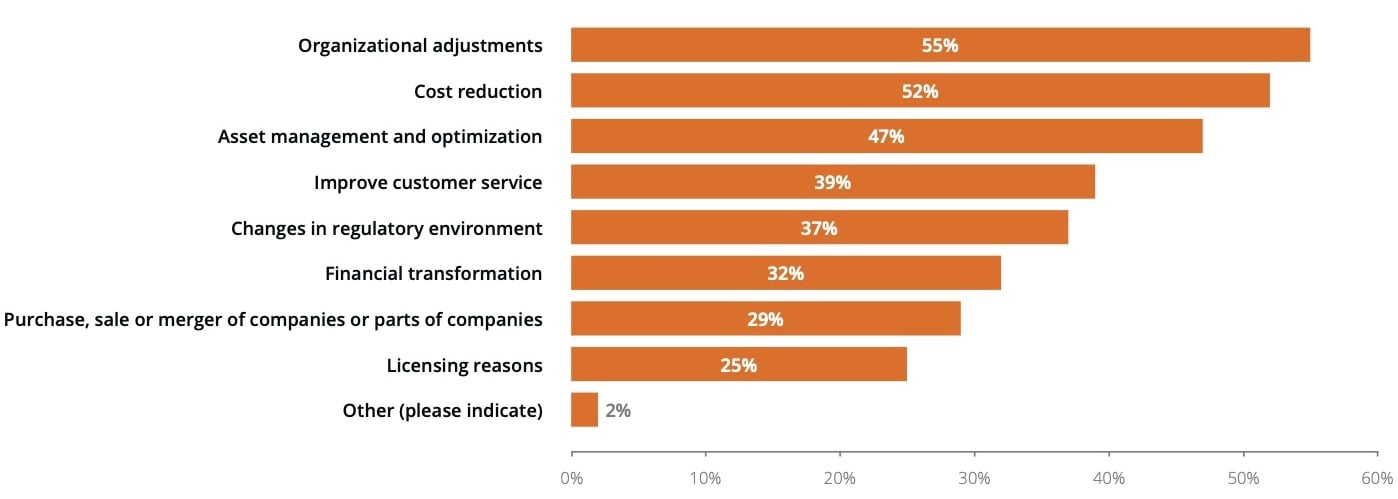
It is widely recognized that qualified IT professionals are in high demand, and many companies have been facing challenges in finding new employees for quite some time. However, the study reveals that even the existing personnel of US utility companies lack the necessary qualifications. This has presented additional obstacles in project planning and may have contributed to the growing need for external consultants who specialize in the industry and change management – thus leading to a shortage of such consultants. Another noteworthy finding in response to this question is the difficulty in analyzing the company's current data and systems, as mentioned by 39% of respondents. This could also be attributed to a lack of awareness and experience with the powerful analytical tools available today, which are widely and successfully used in transformation projects worldwide. These tools have the potential to significantly reduce the time required to gain a meaningful overview of a company's data assets.
The following graphic provides an overview of the greatest challenges in planning the transformation initiative.
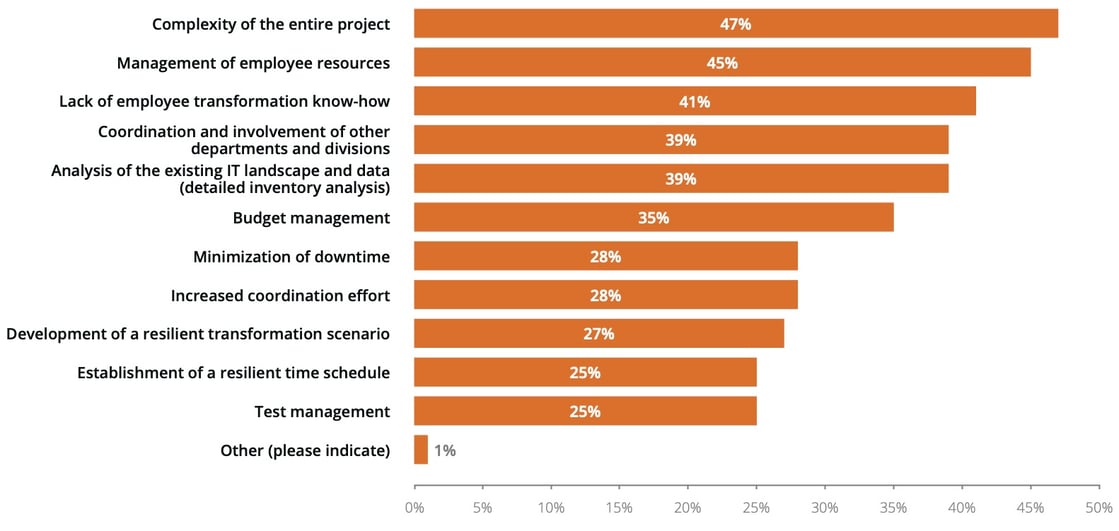
Regarding the implementation process, we were curious about the technical and organizational measures taken by utility companies and how crucial they were for the project. In our survey, we asked respondents to choose all the factors that were relevant to them. When it comes to technical measures, data analysis, and inventory assessment are the most important. Close behind are data quality control, the organization of test systems, and the purchase of software. In fifth place is the reduction of data volume, which clearly shows that cost-conscious companies are heading in the right direction with their transition.
The results of this question emphasize the importance of conducting a thorough housekeeping initiative before the transition. Flawed and outdated data will continue to affect the efficiency of the company after the transition, leading to increased costs and IT workload. The consideration of hardware ranks at the bottom with a relatively low percentage, indicating the growing adoption of cloud solutions among utility companies.
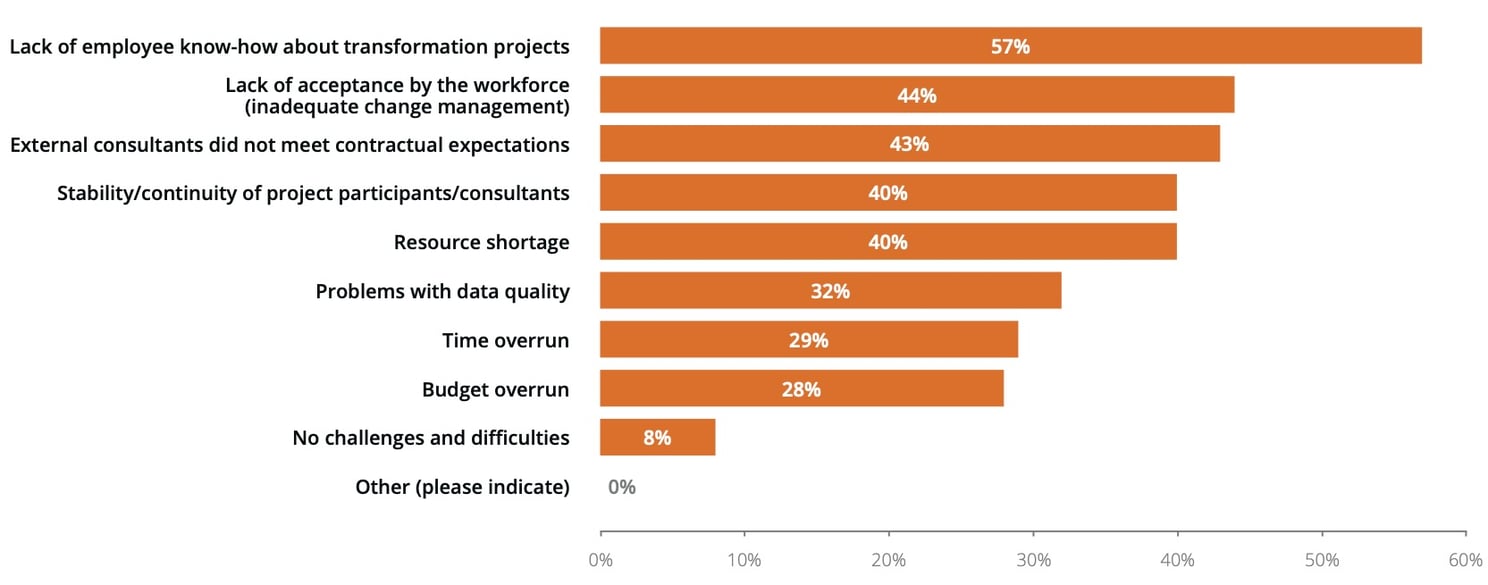
A significant challenge identified by 57% of the utility companies surveyed is the lack of expertise among their personnel regarding the transition. It is not surprising, considering that over a third of the surveyed utility companies have not transitioned their systems for more than a decade. What is concerning, however, is that 44% of respondents noted a lack of acceptance by the staff, compared to only 21% in the cross-industry study.
Although the surveyed utility companies did hire external specialists and consultants to fill knowledge and resource gaps, they were often disappointed with the selected consultants. 43% of respondents faced issues where external consultants did not fulfill their contractual obligations. This problem was undoubtedly worsened by the scarcity of resources and the lack of continuity among project participants, experienced by 40% of respondents. Both Utegration and Natuvion have the impression that utility companies significantly underestimated the scope and complexity of the project, especially regarding the required skills, which has been one of the most commonly mentioned "surprises" in the transformation process.
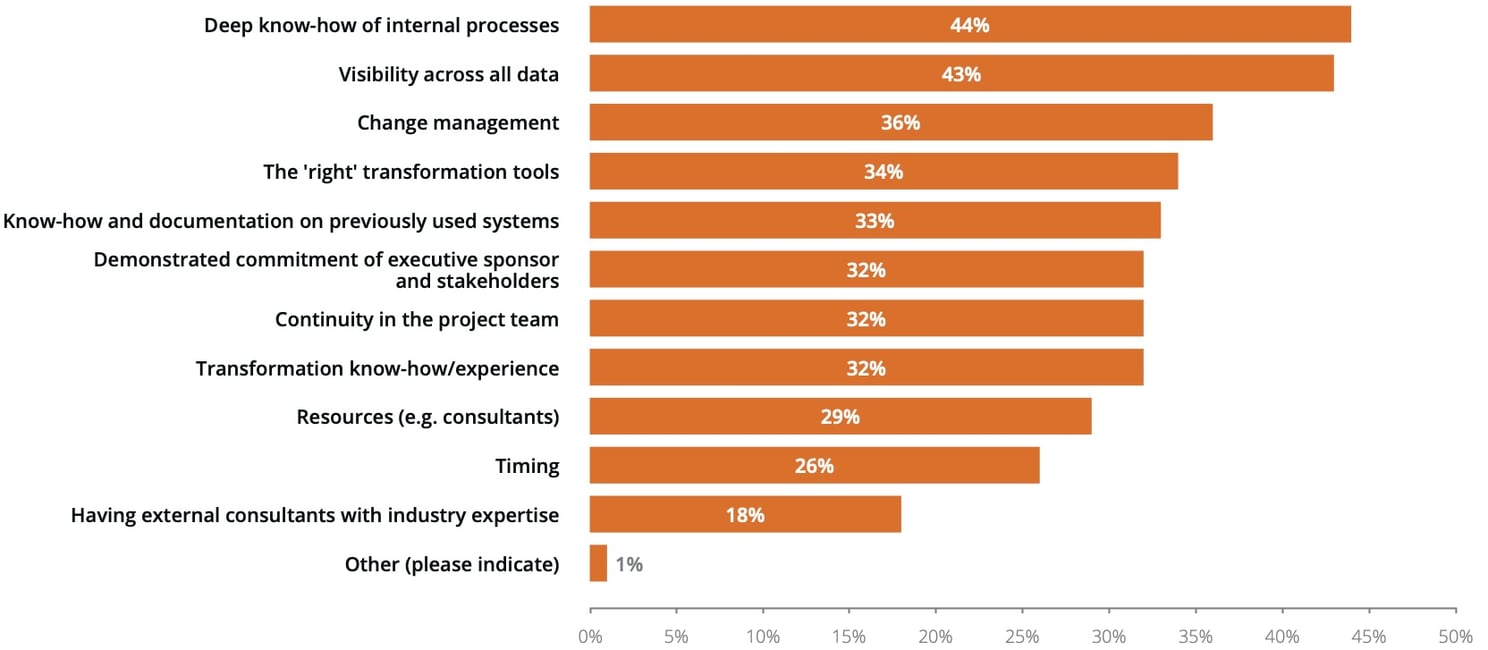
The deep knowledge of internal processes and visibility of all data are identified by U.S. utility companies as the two most crucial factors for success in the transformation process. Undoubtedly, the transparency of all data (assuming its accuracy) will greatly assist utility companies in efficiently managing all aspects of their operations.
The deep knowledge of internal processes and visibility of all data are identified by U.S. utility companies as the two most crucial factors for success in the transformation process. Undoubtedly, the transparency of all data (assuming its accuracy) will greatly assist utility companies in efficiently managing all aspects of their operations.
The U.S. Utilities Transformation Study highlights the importance of thorough planning and preparation before initiating a project, as indicated by U.S. utility companies. In fact, according to Utegration, clients should allocate a preparation period of one to two years before starting a major migration. This is because such projects depend on various factors, including business alignment, budgets, board approval, and other project priorities and tariff cycles.
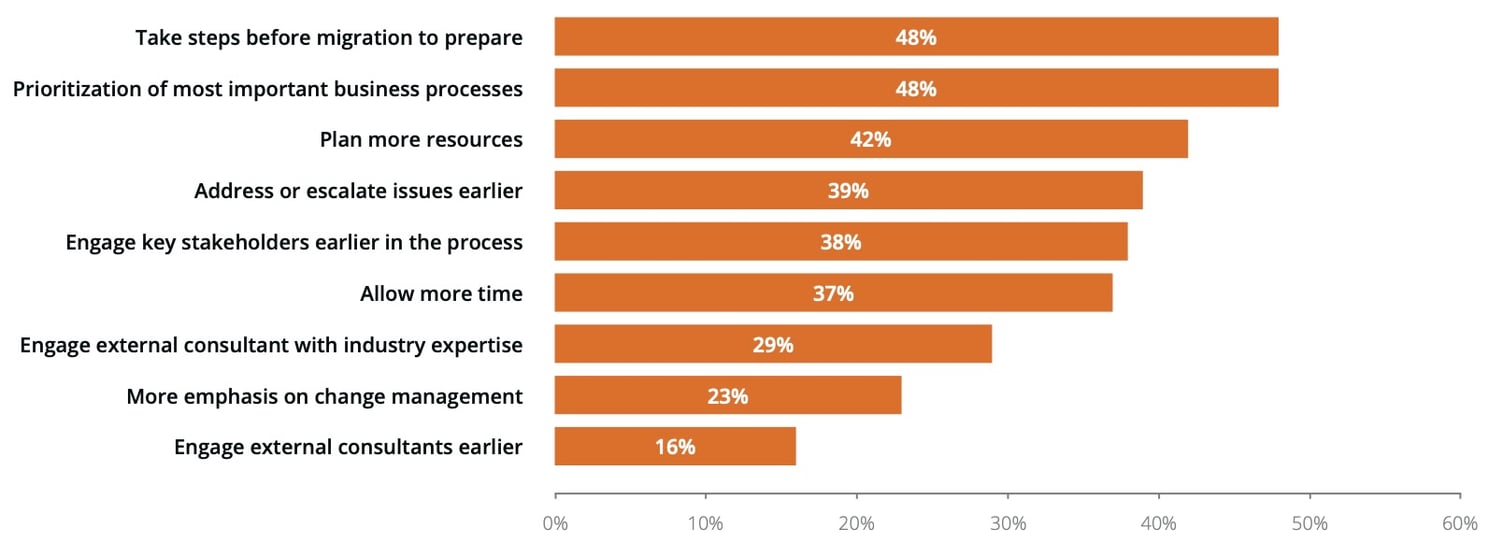
Furthermore, the survey reveals that companies should not underestimate the value of human resources when planning a transformation project. Allocating more resources overall, involving key stakeholders earlier, and engaging a consultant with industry knowledge are recommended by 42%, 38%, and 29% of respondents, respectively. Once a project is underway, there are effective tools and accelerators available for data and process migration, as well as in-app learning tools for smoother change management. However, it is important to emphasize that planning, preparation, and expertise are irreplaceable in ensuring the success and smooth progression of transformation projects.

The situation is all too familiar: IT systems grow and thrive, and users become hunters and gatherers of data. Sooner or later, you inevitably must...

In recent years, few topics have been discussed as intensely in the SAP industry press as the end of maintenance for SAP ERP 6. The industry press is...

Successful transformations require careful planning, accurate system insights, and a clear strategy. Companies should have a clear vision, choose the...